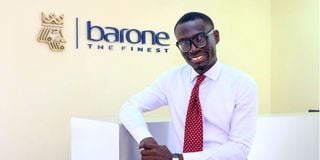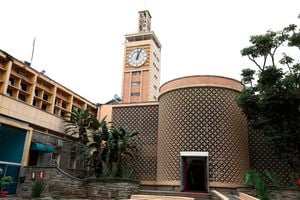Meet the young Kenyan man making bespoke silk shirts from Nairobi

Brian Kisimba, Managing Director of Barone the Fitness poses for a photo at his offices in Westlands Nairobi
What you need to know:
- Brian Kisimba, who dresses Kenya’s affluent, specialises in luxury apparel and knows his market for premium products well
- One locally renowned wearer of distinct breathable textiles, such as silk, is retired President Uhuru Kenyatta
Over the years, luxury brands have set base in the country, owing to its tag as a regional economic hub, keen to tap into the growing market of the ultra-rich.
Those who partake in Kenya’s luxury market are well-travelled, sophisticated, better informed, and have had exposure to premium products and niche offerings.
Brian Kisimba, who dresses Kenya’s affluent, specialises in luxury apparel and knows his market for premium products well. One locally renowned wearer of distinct breathable textiles, such as silk, is retired President Uhuru Kenyatta.
Owing to its limited accessibility and costly production, silk is mostly a preserve of the rich. It takes over 5,000 silkworms to produce a kilogram of silk.
Kisimba, the proprietor of Caliber Bespoke, a tailoring house, founded Barone Shirts in 2019, a shirting outlet addressing growing taste for finely tailored shirts, which the wealthy had to source from the world’s top fashion destinations.
“Originally, we exclusively had this service available to patrons over at Caliber Bespoke and only on request. We were not ready-to-wear and served on a case-by-case basis, but we have since operationalised and optimised for capacity,” he says.
Having been trained in the UK by the acclaimed owner and creative director of Maurice Sedwell bespoke tailors, Andrew Ramroop, Kisimba has the skills of an ultra-bespoke tailor.
“At Barone, we are specialty shirt maker, particularly vested in fine silk and cotton fabric varieties. We are currently positioning for export with talks ongoing regionally and internationally. Our biggest motivator is having Africa express itself just as eloquently as its European counterparts.”
To kick-start his business, Kisimba advanced Sh7 million from personal sources to establish sourcing relationships and set up supply chain infrastructure. He says that they spent quite a bit in licensing design work and patterns from creatives.
“Usually, with patterned and/or printed fabrics, the design work or illustrations printed onto the fabric are what give it mood and character, and good pattern designers are just so hard to find. We have a vault of designs whose licenses we have purchased and are slowly rolling out,” he notes, adding that they also spent a lot on machinery, upskilling labour, office space setup as well as sampling activities with suppliers.
Barone Shirts was set up primarily to respond to the desires of existing suiting patrons over at Caliber Bespoke, who increasingly asked for a complimentary offer to their bespoke suiting program.
Kisimba observes that the Covid-19 pandemic gave people the latitude to discover more expressive alternatives to portraying taste and status besides complete suits and ties, and so they booked a rising number of requests as pertains to expressive shirting.
“Given a background in bespoke tailoring, I would say we had a winning hand at shirt making because we had previously been making shirts on an individual/bespoke basis, so what we did was pivot into this underserved niche,” he says, adding that they started by introspecting to establish essence for Barone as a house and mapped out its trajectory; how they would identify vis-à-vis brand presentation and what specific void they would be filling or which segment of the market place they would be serving and articulating to.
Also Read: 23 KRA top bosses moved in performance push
Market study for tastes and design preferences as pertains to patterns, as well as analysis of different body physiques, then followed. This, he says, facilitated the realisation of an inclusive size chart that accommodates both lean and portly bodies. They then proceeded to supply chain management. All this took over a year to accomplish.
“We have a very deliberate approach to what we do, and we communicate this elaborately through our brand story, product offering, positioning, and clientele that we attract. The tangible idea is to present to patrons creations that are just as alive and defined as what you would find in any other first-world country. And we have taken all necessary measures to ensure this.”
Kisimba trained in London, at a house called Maurice Sedwell along Savile Row. He identifies as a bespoke cutter more than a tailor as that was what he spent most time learning, but still, he tailors just as well.
Barone Shirts sources its fabrics from a spectrum of places, mostly Europe and Asia, as they make remarkable weaves for shirting.
“We have Fine Silk from Italy, Thai Silk, Fine Cotton from Egypt, as well as Indonesian Batik. We inspect the fabrics for discrepancies in quality and weight before moving on to log the quantities,” he says.
Any defective items are returned. The fabrics are then laid onto cutting tables and proprietary patterns are used to cut out the fabric into sizes from small to 4XL.
“The issue with silk as a fabric is that you cannot layer it while cutting because it is slippery, so each shirt has to be individually cut, hence the reason why most manufacturers shy away from making garments out of silk. It needs a lot of patience,” explains Kisimba.
Also Read: Stephen Jeremiah, the young Makueni farmer and his pawpaws
As for distribution, they are currently actively engaging with various partners internationally and are readying stock for disbursement. He says that they are more-so set up for export but are also opening up to local players for stocking and distribution agreements.
“Our clientele primarily comprises individuals who appreciate statement pieces that are finely tailored with scrupulous attention to detail. We are a very niche offer, with very niche appeal, so we specialise our offer. We identify as shirt makers and shirt makers only, and we take the specialist approach.”
The statement shirts range from Sh45,385 for cotton varieties while for silk options, the price comes to around Sh187,736.
“We are still in the penetration streak, but so far, I would credit the philosophy of the house and it’s positioning as being pivotal to shaping market acceptance and product uptake.”
Kisimba explains that focusing on working with the best of the best, be it in fabric or craftspeople, has facilitated the unique and truly worthy creations boasted of by each of their patrons. The idea to align for global take-off has also been instrumental to business prosperity.
But it has not been all smooth sailing for Kisimba. His greatest challenge was finding reputable suppliers of genuine silk.
“We have received samples touted as being 100 percent silk yet prove to be satin upon test hence the reason for our thoroughness in doing due diligence. Finding talented creatives with an eye for unconventional design was also involved,” he says.
Barone Shirts has a collective of five tailors, one cutter, and a team for front office, administration, and sales. They also handle deliveries themselves, so they have a rider on board.
For the business, Kisimba has a multitude of goals, some gargantuan, but his most identifiable one is to be established as the pinnacle of luxury shirting to ever emanate from Africa.
“We are changing lives, especially for our craftspeople. As for the greater society, there is only so much we can do. Our design language equally shapes the perception of the brand and how people perceive Kenya from outward looking in,” he says, and adds that they are an esteemed brand, deliberately attractive to a certain market group.
Barone Shirts is very selective of the materials and labour that it puts into crafting its pieces, hence comes across as identifiably distinctive.
Kisimba explains that they have structured mostly for export and are finalising with key distributors in the global arena. They are also surveying retail spaces within key cities in the country for an elevated in-person experience with clients.
“We are currently receiving clients at our operations center in Westlands and also have an eye out for local distribution engagements and are in the talking phase with a couple.”





